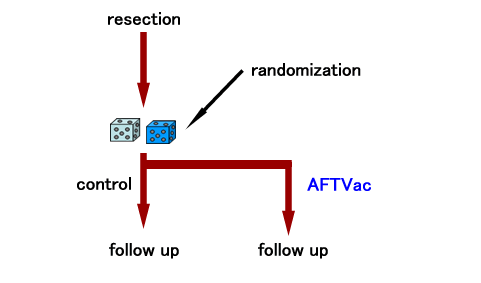High rate of recurrence has been well known even after curative resection of hepatocellular carcinoma (HCC, the most frequent liver cancer).
Recurrence control is the primary goal of novel HCC treatments.
To observe prophylactic effect of AFTVac on HCC recurrence, patients were enrolled if they were having histologically confirmed HCC (mono-centric HCC stage II or lower) and adequate hepatic function (Child-Pugh A and B).
Further inclusion criteria were age 18-80 and no systemic chemo-, radio-, or immuno-therapy within 1 month prior to the vaccination. They were enrolled with written informed consent.
The patients were treated in three cohorts, containing at least 3 patients each. We gave increasing doses of the vaccine. Recurrence of HCC was detected by imaging techniques (ultrasonography and CT-scan) and confirmed by pathological inspection after needle biopsy or secondary resection.
REF: Peng, B. G., Liu, S. Q., Kuang, M., He, Q., Totsuka, S., Huang, L., Huang, J., Lu, M-D., Liang, L-J., Leong, K. W., and Ohno, T.*: Autologous fixed tumor vaccine: A formulation with cytokine-microparticles for protective immunity against recurrence of human hepatocellular carcinoma. Jpn. J. Cancer Res. 93: 363-8, 2002. (*Corresponding author)
Fig. 1
For dose-1, -2 and -4 tests (there is no dose-3 because we approximately doubled and quadrupled contents of the vaccine components), all patients (3 per group) tolerated the vaccination well. We observed no adverse effect in the patients except patient-3 (dose-1) and patient-8 (dose-4), both of whom showed dry desquamation and pruritus (Grade II) at the injection site 2 weeks after the second and first vaccine injection, respectively. These weak adverse effects disappeared after 2 weeks.
In the follow-up observation, two of DTH-response-negative patients in the dose-2 group revealed the first recurrence 9 and 10 months after the curative resection. However, we observed no HCC recurrence in any of the other patients when the majority of the patients passed through one year after the resection (Red line).
We compared these HCC recurrences with those of historical control patients (Blue line). To avoid potential bias influenced by technology in the curative resection of HCC, we restricted historical control patients, as the vaccinated patients, to those operated in the same department, with histologically-confirmed mono-centric HCC, and born closest to the period preceding the present clinical trial with no further treatment before the time of HCC recurrence.
After applying strictly the same eligibility and exclusion criteria of the Phase I/IIa patients, we enrolled 24 patients in the historical control group. No essential difference was observed between the 12 vaccinated patients and the 24 historical control patients in the base-line data except that contents of HBV-positive patients are mismatched, i. e., the former and the latter included 10 (83%) and 14 (58%), respectively.
The two groups revealed statistically significant difference (log-rank test, P<0.05).
The recurrence in these historical control patients was consistent with the observation of Lai, et al.
1 year after the operation (Lai, E. C., et al. Hepatic resection for hepatocellular carcinoma. An audit of 343 patients. Ann. Surg ., 221: 291-298, 1995).
So far as we have observed for more than a year, no adverse effect was found in the hepatic function of the vaccinated patients.
Vaccination-related impairment of other vital organ (i.e., kidney and bone marrow) functions was not found. Occurrence of autoimmune disease was not observed.
Phase IIb clinical trial with randomized control patients
We have conducted a phase II clinical trial with randomized control patients to determine if the AFTVac protects against post-surgical recurrence of hepatocellular carcinoma (HCC).
REF: Kuang, M., Peng, B. G., Lu, M. D., Liang, L. J., Huang, J. F., He, Q., Hua, Y. P., Totsuka, S., Liu, S. Q., Leong, K. W. and Ohno, T.*: Phase II Randomized Trial of Autologous Formalin-Fixed Tumor Vaccine for Postsurgical Recurrence of Hepatocellular Carcinoma. Clin. Cancer Res. 10: 1574-1579, 2004. (*Corresponding author)
Fig. 2 Randomization of HCC patients for the Phase IIb clinical trial

Multivariate analysis revealed that the vaccine group remained unchanged compared with the control group.
In a median follow-up of 15 months, the risk of recurrence in vaccinated patients was reduced by 81% [95% confidence interval (CI), 33-95, P = 0.003]. Vaccination significantly prolonged the time to first recurrence, and improved the recurrence-free survival and overall survival rates.
Fig. 3 Recurrence-free survival (P = 0.003)
Fig. 4 Overall survival (P = 0.01)
There was a significant interaction between recurrence after vaccination and tumor size ( P = 0.0004), but the effect was clinically important because all recurrences in the vaccine group were observed in patients with tumors >= 50 mm in size (3/9, 33%), whereas the recurrences in the control patients with tumors >= 50 mm in size were 10/11, 91% (P=0.003).
The survival rate of vaccinated patients with tumors <50 mm in size, TNM stage I/II or negative invasive histology was 100% (0/9, 0/11 and 0/12, respectively), compared with 20% (2/10), 23% (3/13) or 31% (4/13) in the control group. Overall survival in patients with tumors >= 50 mm in size was also significantly improved (P = 0.04). At the end of the follow-up, the mortality rate was 6% (1/18) in the vaccine group and 38% (8/21) in the control group.